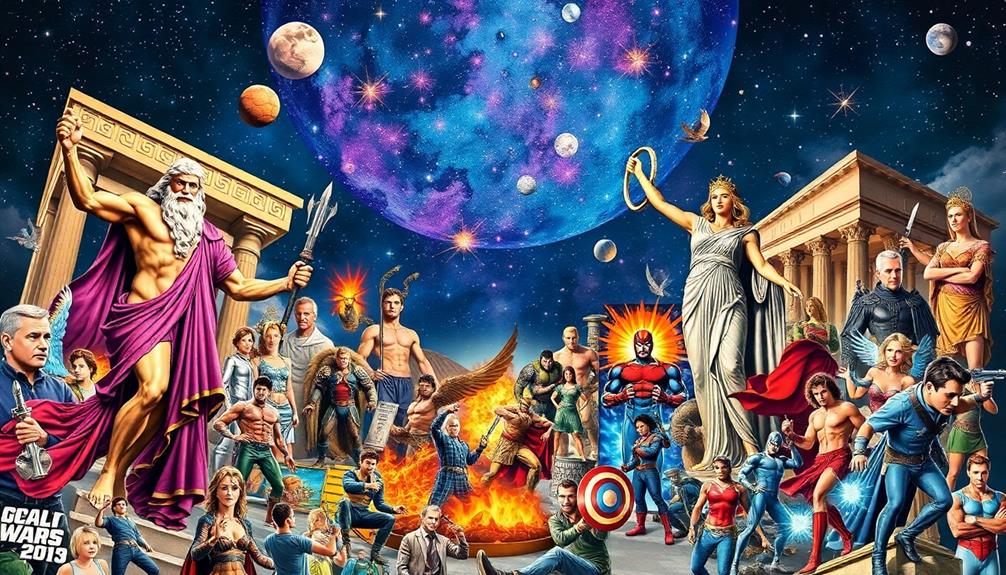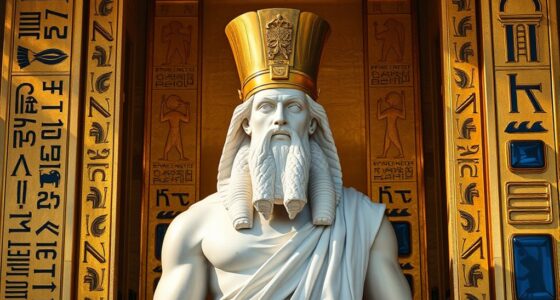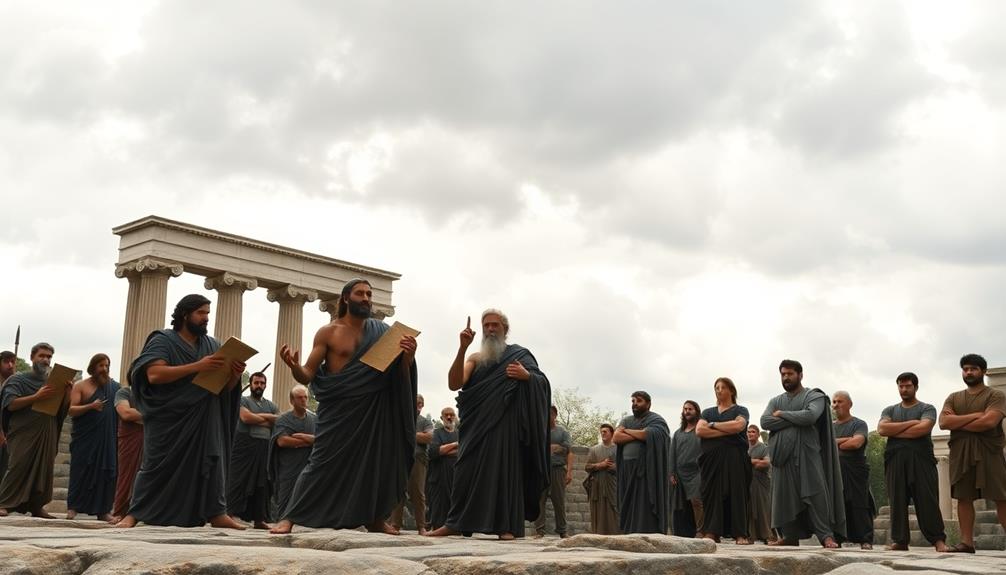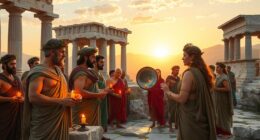Greek mythology touches every corner of pop culture, shaping everything from films and books to common phrases you use daily. You see its influence in Disney's "Hercules" and the "Percy Jackson" series, which bring these ancient tales to life for younger generations. Literary greats like Shakespeare drew on mythological themes, deepening character complexity. Even brand names like Nike reflect mythological roots. As you explore, you'll find that this ancient lore continues to inspire discussions about gender roles and morality today. There's so much more to uncover about how these myths resonate with contemporary society.
Key Takeaways
- Greek mythology serves as a foundation for modern storytelling, influencing character arcs and themes in literature and film.
- Popular films and shows, like Disney's "Hercules" and "Xena: Warrior Princess," revive ancient myths for contemporary audiences.
- Language and phrases derived from myths, such as "Pandora's box" and "Achilles' heel," remain integral to everyday communication.
- Video games like "God of War" engage players with immersive experiences rooted in mythological narratives, blending entertainment with ancient lore.
- Mythological themes in branding, such as Nike and Amazon, highlight the enduring cultural relevance and recognition of Greek mythology in modern society.
Origins of Greek Mythology
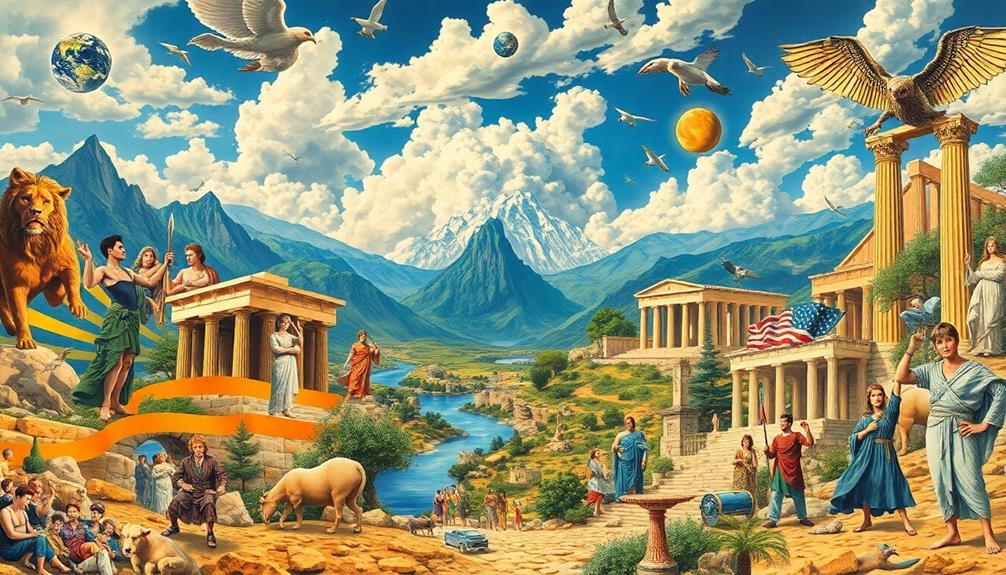
Greek mythology has its roots deeply embedded in ancient Greece, emerging as a way for people to explain the world around them. The origins of Greek mythology can be traced back to oral traditions, where stories were passed down through generations before being recorded by poets like Homer and Hesiod. These narratives often served as creation myths, showcasing divine interventions that shaped the earth and influenced human experiences.
You'd find that Greek mythology reflects key themes central to ancient Greek society, such as hubris, divine retribution, and the intricate balance between fate and free will. These myths provided not just entertainment but also moral education, illustrating the values and beliefs that defined the culture.
Through timeless narratives, they examined the complexities of human emotions and behavior, making them relatable even today. As you explore these stories, you'll notice how they continue to inspire global audiences, resonating with contemporary issues.
The rich tapestry of Greek mythology offers insights into the human condition, showcasing its lasting impact on literature, art, and popular culture.
Key Gods and Goddesses
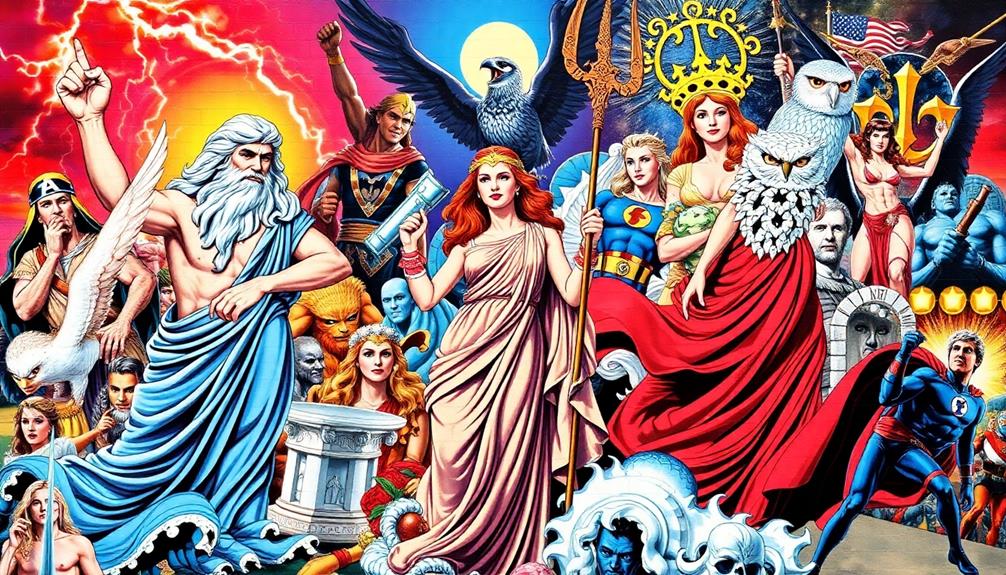
The pantheon of gods and goddesses from ancient mythology captivates audiences with their distinct personalities and powers. In modern culture, these figures resonate through various narratives, each embodying universal themes.
| God/Goddess | Domain | Modern Representation |
|---|---|---|
| Zeus | King of the gods | Authority and power; often depicted with a thunderbolt |
| Poseidon | God of the sea | Control over water; central to maritime adventures |
| Hades | Ruler of the underworld | Misunderstood figure; themes of death and the afterlife |
| Athena | Goddess of wisdom and warfare | Strategic mentor; protector of heroes |
| Aphrodite | Goddess of love and beauty | Central to romance; explores themes of love and desire |
You'll find that Zeus symbolizes power, while Poseidon often drives sea-bound adventures. Hades adds depth with his portrayal as a complex character, inviting empathy. Athena serves as a mentor, guiding heroes through their quests, and Aphrodite weaves love and beauty, inspiring countless romantic tales. Together, these gods and goddesses from Greek mythology shape the core of modern storytelling.
Influence on Literature and Art

Mythological influences have woven their way into the fabric of literature and art, enriching narratives with depth and meaning. Greek mythology serves as a wellspring for countless authors and artists, inspiring masterpieces that resonate with audiences today.
Think about how Shakespeare and Joyce utilized mythological themes to enhance character development and narrative complexity in their works.
In the domain of art, iconic pieces like Botticelli's "The Birth of Venus" and Michelangelo's "David" reflect the enduring appeal of characters from Greek mythology, capturing timeless themes that continue to captivate viewers.
Modern adaptations, such as C.S. Lewis's "Till We Have Faces," breathe new life into ancient stories, demonstrating their ongoing relevance.
You'll also notice that Greek myths frequently pop up in various genres—from poetry to graphic novels—serving as a rich source of symbolism and archetypes.
This versatility showcases how Greek mythology adapts to contemporary literature and art, enriching storytelling across centuries. Each reference adds layers of meaning that enhance your experience, reminding you of the powerful impact these ancient stories have on popular culture.
Greek Mythology in Modern Media
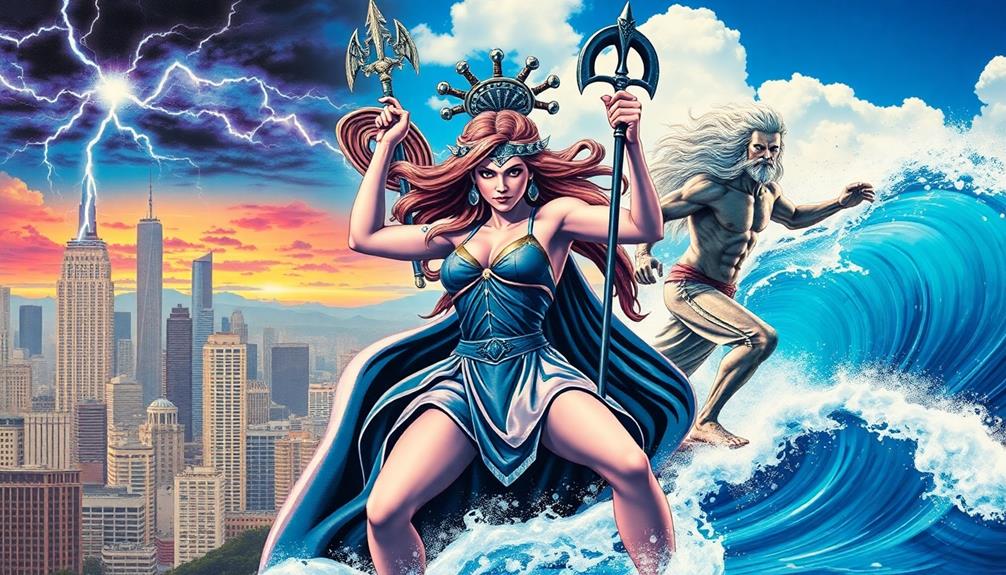
Drawing from ancient tales, modern media has seamlessly integrated Greek mythology into films, television, and video games, creating a vibrant tapestry of stories that resonate with today's audiences. You can see this integration in films like Disney's "Hercules" and "Clash of the Titans," which adapt these timeless narratives, blending adventure with moral lessons that still matter today.
The "Percy Jackson" book series has become a cultural phenomenon, enchanting younger generations and spawning a film franchise along with a Disney+ series. This series introduced Greek Gods and mythical figures to a new audience, ensuring that their stories remain relevant.
In the domain of TV shows, "Xena: Warrior Princess" and "Hercules: The Legendary Journeys" were pivotal in the 1990s, showcasing the ongoing popularity of these mythological narratives.
Video games like "God of War" and "Assassin's Creed: Odyssey" allow players to engage directly with these myths, transforming ancient tales into immersive experiences.
Through these various forms of modern media, Greek mythology continues to leave a lasting impact on popular culture, with mythological references becoming part of everyday language and thought.
Lasting Cultural Impact
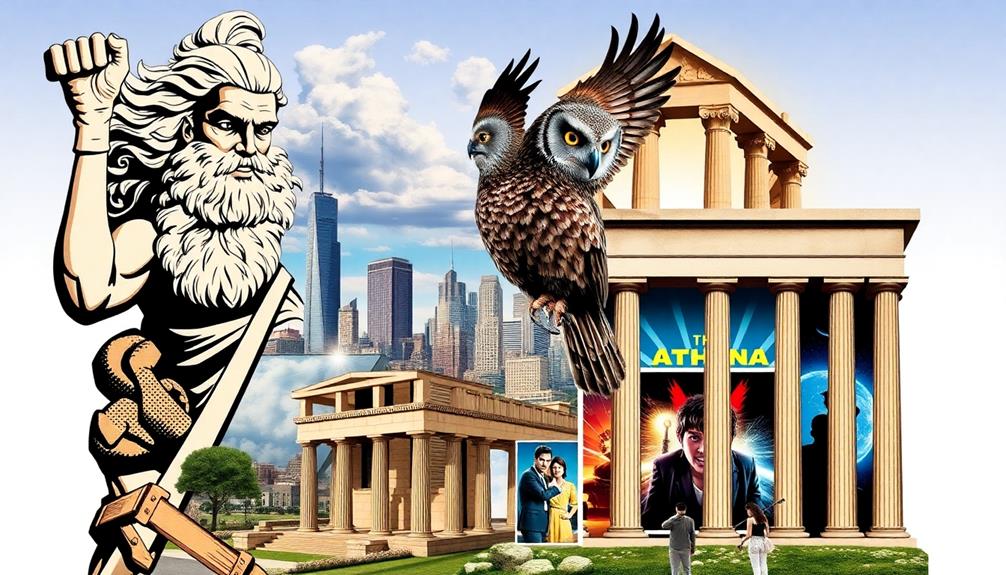
Greek mythology's influence on culture goes far beyond modern adaptations in media; it shapes how we view the world today. The lasting cultural impact of these ancient narratives is evident in various aspects of our lives:
- Branding: Companies like Nike and Amazon derive their names from Greek mythology, reinforcing their identities.
- Language: Phrases such as "Pandora's box" and "Achilles' heel" permeate our everyday conversations, illustrating the myths' relevance.
- Gaming: Titles like "God of War" and "Hades" bring Greek myths to life, allowing you to engage with these stories interactively.
- Cultural Festivals: Events celebrating mythological themes foster community engagement and reflection on these timeless narratives.
- Representation: The portrayal of women in Greek mythology continues to inspire discussions on gender roles and empowerment in modern contexts.
Frequently Asked Questions
How Has Greek Mythology Affected Pop Culture?
Greek mythology shapes pop culture by inspiring films, literature, and brands. You'll see mythological themes in storytelling, iconic characters influencing narratives, and even phrases you use daily, enriching your understanding of culture and communication.
How Did Greek Mythology Affect Culture?
You might not realize it, but Greek mythology shapes your culture daily. From language to literature, its stories influence your thoughts and behaviors, weaving timeless themes into modern life and sparking creativity across various forms.
What Is the Impact of Greek Mythology in Today's World?
Greek mythology shapes today's world by influencing storytelling, branding, and language. You'll find its themes in movies, books, and even product names, reminding you of ancient narratives that continue to resonate in modern culture.
What Was the Impact of Greek Culture?
Greek culture's impact is profound; it shapes your language, art, and government. You see democracy's roots in ancient Athens, while architecture and literature continue to inspire modern creations, enriching your cultural experiences today.
Conclusion
As you immerse yourself in the vibrant tapestry of pop culture, you'll see how Greek mythology weaves its threads through the stories and images that captivate us. The echoes of ancient gods and epic tales resonate in movies, books, and art, reminding us of our shared human experience. Just like a timeless melody, these myths continue to inspire creativity and spark our imaginations, proving that the past is never truly lost—it's alive, breathing through each new generation.
